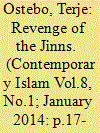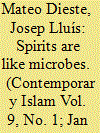| Srl | Item |
| 1 |
ID:
164026


|
|
|
|
|
| Summary/Abstract |
In this article I apply film theory as an analytic prism through which to examine the ritual mechanisms of a particular kind of Islamic exorcism (al-ruqya al-sharʿiyya). I show how these exorcisms operate as a ritual montage that conjures the absent presence of al-ghayb—a hidden world of power that only God can see in its totality and to which the possessed patients and the jinn spirits must succumb. These exorcisms thus provide healing, not in the sense of immediate “well-being” or “relief from pain” but in the sense of moral witnessing, an opportunity to testify to the limits of human seeing and action and to the ways in which invisible and divine forces give shape to the tangible world.
|
|
|
|
|
|
|
|
|
|
|
|
|
|
|
|
| 2 |
ID:
131476


|
|
|
|
|
| Publication |
2014.
|
| Summary/Abstract |
The point of departure for this article is a story about jinns taking revenge upon people who have abandoned earlier religious practices. It is a powerful account of their attempt to free themselves from a past viewed as inhabited by evil forces and about the encounter between contemporary Salafi reformism and a presumed disappearing religious universe. It serves to prove how a novel version of Islam has superseded former practices; delegitimized and categorized as belonging to the past. The story is, however, also an important source and an interesting entry-point to examine the continued relevance of past practices within processes of reform. Analyzing the story about the jinns and the trajectory of Salafi reform in Bale, this contribution demonstrates how the past remains intersected with present reformism, and how both former practices and novel impetuses are reconfigured through this process. The article pays attention to the dialectics of negotiations inherent to processes of reform and points to the manner in which the involvement of a range of different actors produces idiosyncratic results. It challenges notions of contemporary Islamic reform as something linear and fixed and argues that such processes are multifaceted and open-ended.
|
|
|
|
|
|
|
|
|
|
|
|
|
|
|
|
| 3 |
ID:
137512


|
|
|
|
|
| Summary/Abstract |
This article analyses the revitalisation of Islamic exorcism in Morocco since the 1990s and how its practitioners legitimise it as a ritual largely adapted to theological orthodoxy. The rhetoric of these exorcists on spirit possession defines certain afflictions as an intromission of the genies (jnun) into the body by physical mechanisms, comparable to the processes undertaken by microbes. From interviews and observation of ritual exorcism of Moroccan faqihs in Tetuan and Barcelona, I analyse their techniques and the way they legitimise them. I conclude that the moral intervention of religious specialists through Koranic recitation becomes effective throughout a dynamic worldview that reinforces old basic assumptions about a physical intercourse between jnun and humans. At the same time, with the revitalisation of the ritual, many Koranic exorcists incorporate new rhetorics to demonstrate scientifically the materiality of the jnun and their effects on the possessed bodies. But Moroccan Koranic healers not only rework definitions of affliction and legitimise the physical agency of the jnun, they also contribute to define gendered experiences of the body as far as women are conceived as the favorite and weakest victims of the genies.
|
|
|
|
|
|
|
|
|
|
|
|
|
|
|
|